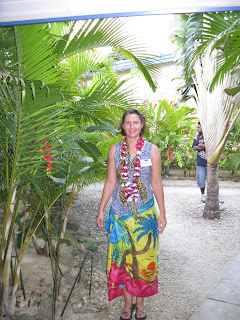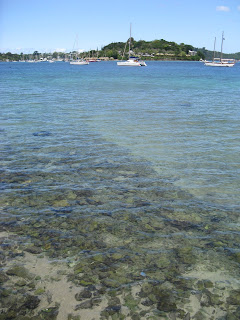.jpg) Well, it's official. We are no longer trainees, we have the certificate to prove it. This is my group, in our matching aelan shirts and dresses at the swearing-in ceremony. This was my Thanksgiving celebration.
Well, it's official. We are no longer trainees, we have the certificate to prove it. This is my group, in our matching aelan shirts and dresses at the swearing-in ceremony. This was my Thanksgiving celebration..jpg) During our first few weeks of training, this was a common sight. We had a lot of our classses underneath a giant mango tree, sort of a community meeting place. Unfortunately for our sense of security, it was mango season and we were constantly being bonbarded by mangoes. They are really heavy when falling from 25 feet above. We did really enjoy the fresh mangoes, though!
During our first few weeks of training, this was a common sight. We had a lot of our classses underneath a giant mango tree, sort of a community meeting place. Unfortunately for our sense of security, it was mango season and we were constantly being bonbarded by mangoes. They are really heavy when falling from 25 feet above. We did really enjoy the fresh mangoes, though!.jpg) This is a picture of my host sister, Gloria, a distant cousin and his mom, Sala and Leman, and my other host sister in the background, Juliet. While my host family was busy caring for a grandmother who became seriously ill, Leman and Sala came to stay and take care of me. Leman is married to one of the chief's sons, Joe, who would be a first cousin to me. Got that?
This is a picture of my host sister, Gloria, a distant cousin and his mom, Sala and Leman, and my other host sister in the background, Juliet. While my host family was busy caring for a grandmother who became seriously ill, Leman and Sala came to stay and take care of me. Leman is married to one of the chief's sons, Joe, who would be a first cousin to me. Got that?.jpg) This is a sample of our daily lunch buffet. The mamas would cook and bring down our lunch each day so we had a lot of choices. The greenish dishes are made with aelan kabis (island cabbage) which I guess is kind of like turnip greens. There are also pancakes and fried plantains. The sauce pans contain various soups with chicken wings or beef and usually ramen style noodles. We also had rice with every lunch. It has become a staple for Mangaliliu and for a lot of Vanuatu, though there is a local-foods movement here that is trying to bring back the manioc and taro as the staple foods.
This is a sample of our daily lunch buffet. The mamas would cook and bring down our lunch each day so we had a lot of choices. The greenish dishes are made with aelan kabis (island cabbage) which I guess is kind of like turnip greens. There are also pancakes and fried plantains. The sauce pans contain various soups with chicken wings or beef and usually ramen style noodles. We also had rice with every lunch. It has become a staple for Mangaliliu and for a lot of Vanuatu, though there is a local-foods movement here that is trying to bring back the manioc and taro as the staple foods..jpg)
I find this amazing, every day. The waters here are so beautiful that I find myself taking lots and lots of ocean pictures just because each day seems more beautiful than the last. These two pictures are from a trip to Hat Island that we took to visit the grave of Chief Roi Mata, a Vanuatu cultural hero. After arriving on the island and paying our respects to the chief, a number of our papas and brothers went fishing for our lunch. You can see a few of the trainees and papas or brothers roasting the fish over the fire.
.jpg)
My host papa has one brother and three sisters. This picture includes two of the sisters and the sister-in-law. The two trainees pictured are considered cousins. We went down to my family's bungalow, built by some of my cousin-brothers as a guest "cottage," for a picnic and swimming on our last two weekends in Mangaliliu.
.jpg)
This is the dinner for our swearing-in ceremony. I love the decorations here; the people make such wonderful use of the palm fronds and flowers that grow. It was a great party!
.jpg)
Saying goodbye to our host families and the rest of the village. This sort of "receiving line" is pretty typical. We have one every Sunday after church too, featuring whoever is a guest that day--new visitors or people who have returned from a trip or a visiting elder. This is only a small portion of the full line of people.
And now we are in Port Vila for a week or so, buying supplies and preparing for departure to our permanent sites. Three of us left today, another 5 leave tomorrow and the rest of the group will go on Friday and Saturday. It's kind of strange actually. In my traveling experience, when you return to the place you started, it's to catch a flight back home. But this time, it's to prepare for the long part of my stay. It has been hard for me to wrap my head around the idea but arriving in Saratamata on Thursday instead of the states will help the concept to sink in. :)
I will try to get back here to the internet cafe one more time to post some pictures of Saratamata and my host family there. I've got to meet some other volunteers at the local "Wal-mart" and pick up the rest of my supplies.
Miss you!
.jpg)









